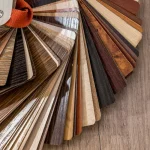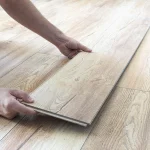- October 18, 2024
Hardwood flooring generally costs between $5 and $15 per square foot for materials, while tile ranges from $1 to $20 per square foot. This makes tile the more budget-friendly option in many cases.
When choosing the right flooring for your home, cost is often a primary consideration. Hardwood and tile flooring both offer unique advantages. But hardwood vs. tile costs can vary significantly. This article will explore the initial costs and long-term considerations for 2 options, thus helping you make the right choice.
Hardwood vs. Tile: Initial Costs
The battle “hardwood vs. tile cost” is a common dilemma for homeowners.
Hardwood flooring is often celebrated for its timeless beauty, warmth, and ability to elevate a space’s ambiance. With a lifespan of 25 to 100 years, it can be refinished multiple times. This advantage makes it a long-lasting investment. However, hardwood can be susceptible to moisture, making it less ideal for bathrooms or basements.
On the other hand, tile flooring boasts remarkable durability and water resistance. This makes tile a popular choice for high-traffic areas and moisture-prone spaces. With a diverse range of materials, colors, and patterns, tile offers flexibility in design. Although tile can be more affordable initially, installation can be more labor-intensive, which may increase costs.
Material and Installation Costs: Hardwood vs. Tile Costs
The cost of hardwood varies significantly based on factors such as the type of wood, quality, and whether it’s solid or engineered. On average, homeowners can expect to pay between $5 and $15 per square foot for the material. Exotic woods or higher-grade finishes can push prices even higher.
Other Comparisons to Read:
Additionally, installation costs typically range from $4 to $8 per square foot, depending on the complexity of the job and the contractor’s rates. While the initial investment for hardwood may be greater than alternatives like laminate or tile, its durability, aesthetic appeal, and potential to enhance a home’s resale value make it a compelling choice for many buyers.
The cost of tile varies widely based on several factors, including the type of tile, quality, and size. Generally, homeowners can expect to pay between $1 and $20 per square foot for the material, with ceramic tiles typically being on the lower end of the price spectrum. But porcelain and natural stone options can command higher prices. Installation costs usually range from $5 to $10 per square foot, influenced by factors such as tile weight, layout complexity, and the need for leveling or grouting. Although tile may require a higher upfront investment than some alternatives, its durability, low maintenance requirements, and moisture resistance make it a valuable choice for long-term use in various settings.
Flooring Type | Material Cost per Square Foot | Installation Cost per Square Foot | Total Average Cost (Material+Installation Cost) |
Hardwood | $5 – $15 | $4 – $8 | $9 – $23 |
Tile | $1 – $20 | $5 – $10 | $6 – $30 |
Maintenance Costs
Material | Annual Maintenance Cost |
Hardwood | $2-$5 per square foot |
Tile | $1-$3 per square foot |
Ongoing Maintenance for Hardwood
Hardwood floors require regular maintenance, including sweeping, mopping, and occasional refinishing every 5 to 10 years. This can add to the overall cost, averaging about $2 to $5 per square foot annually.
Also Read: How to Clean Hardwood Floors
Ongoing Maintenance for Tile
Tile flooring has low maintenance, and requires minimal upkeep. Annual maintenance costs typically range from $1 to $3 per square foot.
Resale Value and Durability
Material | Lifespan | Impact on Home Value |
Hardwood | 25-100 years | High |
Tile | 50+ years | Moderate to High |
Impact on Home Value
Hardwood flooring is preferable. It enhances a home’s resale value. Many people like the aesthetic and warmth of hardwood.
Lifespan and Durability Comparison
Hardwood floors can last 25 to 100 years. Tile flooring, on the other hand, is incredibly durable and can last over 50 years, making it an excellent option for high-traffic areas or moisture-prone spaces.
Long-Term Considerations
Hardwood is popular among many homeowners due to its timeless beauty, durability, and warmth. Available in a variety of species, such as oak, maple, and cherry, hardwood offers a range of colors and grains. It’s known for its longevity, often lasting 25 to 100 years with proper care. It also can be refinished multiple times to restore its original luster. However, the initial cost of hardwood flooring can be higher than other options. Its ability to increase a home’s resale value makes it a worthwhile investment. Hardwood is relatively easy to maintain, requiring regular cleaning and occasional refinishing, making it a practical choice for families and individuals alike.
Tile flooring is a versatile and durable option that suits a variety of spaces, from kitchens and bathrooms to living areas. Available in ceramic, porcelain, and natural stone, tile comes in an extensive range of colors, patterns, and sizes. This allows homeowners to create customized looks. The average cost ranges from $1 to $20 per square foot. The installation costs between $5 and $10 per square foot. Tile is particularly valued for its water resistance and low maintenance needs. It requires only regular cleaning to maintain its appearance. Its longevity—often exceeding 50 years—with its ability to withstand heavy foot traffic, makes tile a practical and cost-effective flooring choice for residential and commercial applications.
Here’s a comparison table outlining the pros and cons of hardwood and tile flooring:
Feature | Hardwood Flooring | Tile Flooring |
Pros | Timeless beauty and warmth | Extremely durable and long-lasting |
Refinished multiple times | Water-resistant and easy to clean | |
Enhances resale value of the home | Variety of materials, colors, and patterns | |
Good insulation | Ideal for high-traffic and moisture-prone areas | |
Cons | Higher initial cost and installation | Cold and hard underfoot |
Susceptible to scratches and moisture damage | Installation can be labor-intensive. | |
Requires periodic refinishing and maintenance | Grout lines can stain and require upkeep. | |
Not ideal for all environments (e.g., bathrooms) | Some tiles can be expensive (natural stone, etc.) |
FAQs
- What is the average cost of hardwood flooring?
The average cost for hardwood flooring ranges from $5 to $15 per square foot for materials, with installation costs typically between $4 and $8 per square foot.
- How does tile flooring cost compare to hardwood?
Tile flooring ranges from $1 to $20 per square foot. The installation is $5-$10 per square foot. This makes tile more affordable than hardwood.
- Is hardwood flooring durable?
Yes, hardwood flooring is durable and can last 25 to 100 years with proper care. It can also be refinished multiple times to maintain its appearance.
- Can tile flooring be used in bathrooms?
Absolutely! Tile flooring is an excellent choice for bathrooms due to its water resistance and durability, making it ideal for moisture-prone areas.
- Which flooring option is better for pets?
Tile is often better for pets because it’s more resistant to scratches and moisture. However, certain hardwoods can also be suitable if properly maintained.
- How easy is it to maintain hardwood vs. tile?
Hardwood requires regular cleaning and periodic refinishing, while tile is generally easier to maintain, requiring just cleaning and occasional re-grouting.
- Does hardwood flooring increase home resale value?
Yes, hardwood flooring is often considered a desirable feature. It can enhance a home’s resale value, appealing to potential buyers.
- What are the design options for tile flooring?
Tile flooring offers a variety of designs, colors, ceramic, porcelain, and natural stone, allowing for extensive customization.
- Can I install hardwood or tile flooring myself?
While DIY installation is possible for both options, hardwood may be easier for beginners, especially with click-lock systems, whereas tile installation can be more labor-intensive.
- What is the lifespan of tile flooring?
Tile flooring is incredibly durable and lasts over 50 years. This makes the tile a long-lasting option for residential and commercial spaces.
Our Suggestions | Hardwood vs. Tile Flooring
Choosing between hardwood and tile flooring involves weighing initial costs against long-term considerations. While hardwood typically has higher upfront costs, it offers a warm aesthetic and can significantly boost resale value. Tile, on the other hand, tends to be more budget-friendly. The best choice depends on your specific needs, preferences, and budget.
When comparing hardwood and tile flooring, costs vary widely based on materials, installation, and maintenance. Here’s a quick summary to consider comparing hardwood vs. tile costs:
- Initial Costs: Hardwood can be pricier, but both options offer a range of prices.
- Installation: Tile may be more expensive due to labor, while hardwood can be easier to install.
- Maintenance: Hardwood requires more upkeep, particularly refinishing.
- Durability: Tile generally outlasts hardwood, especially in moisture-prone areas.
- Resale Value: Both options can add value to your home, but hardwood often tops the list.
Before making a final decision, it’s essential to consider the following factors:
- The climate of your area.
- The amount of foot traffic your floors will endure.
- The overall style of your home.
Why Choose Elephant Floors?
Consulting with flooring experts and exploring different materials in person can provide valuable insights on hardwood vs. tile options.
Want to elevate your home with stunning flooring options? At Elephant Floors, we offer a wide selection of high-quality hardwood and tile flooring that combines durability with style. Our expert team is here to help you find the perfect flooring solution that fits your aesthetic and budget. Explore our extensive range today and discover how Elephant Floors can bring your vision to life! Contact us for a consultation and take the first step toward enhancing your home’s beauty and value.


